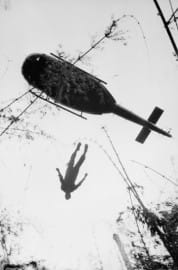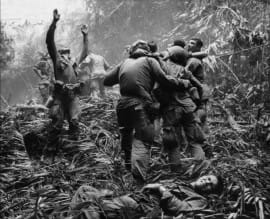The war we would like to forget, but should remember December 2, 2015
“The war our country would like to forget, but should remember’’– that is how Phil Schaefer describes the Vietnam War in his introduction to the collection of essays that he edited under the title Dartmouth Veterans: Vietnam Perspectives. It is four decades ago that the war, which lasted for nearly 20 years, ended abruptly. Many will see in their mind’s eye the iconic photo of the tumultuous evacuation by helicopter from the roof of the US embassy in Saigon – and the desperation in the eyes of the Vietnamese employees left behind.

A helicopter raises the body of an American paratrooper killed in action
To commemorate this painful episode in American history, the John Adams Institute is publishing a series of blogs by Vietnam vets, all of them members of the 1964 class at the venerable Ivy League Dartmouth College in New Hampshire. The book was brought to our attention by one of them, Glen Kendall, who lives in Amsterdam. His essay (to be included in this series) is a wrenchingly personal account of how under fire he “became capable of very terrible things in the cause of ‘making the world free for democracy’” – and of the nightmares that haunted him for years afterwards.
For the 50th reunion of the class of ’64 last year, Phil Schaefer brought together 55 essays by classmates who served during the Vietnam era, most of them as officers. They were part of the 2.6 million Americans who served in the war, of whom more than 58.000 lost their lives and 300.000 were wounded.
Their conclusion: the war was a mistake. “They started off patriotic and idealistic, but halfway through their service most of them had become skeptical and distrustful of the government’s policy,” says Schaefer. “In 1967, ’68, ’69 there were anti-war demonstrations on campuses all across the country. The soldiers felt a strong disconnect between their reality and the ‘information’ the US military was disseminating.” What the Civil War was to the 19th century is what the Vietnam War is to the 20th – and what the Iraqi War may well be to the 21st according to Dartmouth history professor Edward Miller.

Soldiers aiding wounded comrades
Schaefer is himself not a veteran – he was at graduate school getting a PhD in chemistry and was ultimately exempt from the draft. Editing the book all these years later, however, brought him closer to his classmates than he had ever been at college. “And some of them have told me that writing this piece had improved their lives. This was the first time in all those years that they had told anyone about their experiences in the war. The war shaped not just our class, but our whole generation.”
Some members of the class of ’64 have actively shared their experiences with younger generations. Professor Miller teaches a course on the Vietnam War and brings in vets for a panel with the students every year. And now, forty years after the war ended, Miller is taking 22 members of the class of ’64 on a trip to Vietnam, where they will visit four of the former battlefields where they served. For Schaefer, gatherer of the memories of others, it will be a novel experience since this will be his first visit to Vietnam.
‘Dartmouth Veterans: Vietnam Perspectives’, ed. Phillip Schaefer, Dartmouth College Press, 2014. Available on Kindle and Amazon.
Also read editor Phillip C. Schaefer’s introduction (December 4), the essay by veteran Jim Harris (December 7), the essay by veteran Glen Kendall (December 9), the essay by Karl F. Winkler (December 14), the essay by George J. Fesus (December 16), the essay by veteran Carl DuRei (December 18), and the essay by James Laughlin (December 21), the essay by John T. Lane (December 23), and the essay by Bud McGrath (December 27).